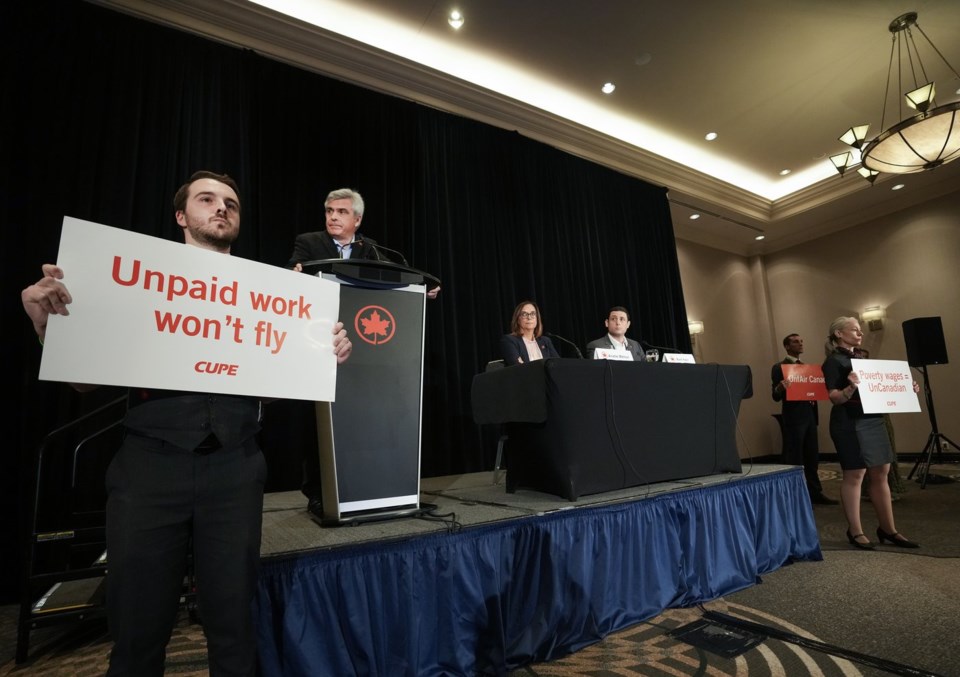Labour experts say if Ottawa meets Air Canada's call for government intervention in a contract dispute with its flight attendants' union, it could further erode collective bargaining rights in future negotiations.
The airline has requested government-directed arbitration through Section 107 of the Canada Labour Code, however Ottawa has not indicated whether it will intervene.
The move comes as roughly 10,000 flight attendants for Air Canada and Air Canada Rouge are poised to strike Saturday around 1 a.m., with the company also planning to lock them out if an eleventh-hour deal can't be reached.
Federal Jobs Minister Patty Hajdu said she has asked the union to respond to the company's request for a referral to send the parties to arbitration. The union has indicated it plans to do so by Friday at 12 p.m. ET.
She urged both sides to return to the bargaining table.
"The deals that are made at the bargaining table are the best ones," said Hajdu in a statement.
"To the parties: I strongly urge you to come to an agreement -- do not waste this precious time. Canadians are counting on you."
Brock University labour professor Larry Savage said Air Canada is using its lockout notice "as a pressure point on the prime minister," as the Mark Carney-led Liberal government faces its first major work stoppage of federally regulated employees.
Under former prime minister Justin Trudeau, Ottawa was called upon last year to intervene through binding arbitration in a potential strike by Air Canada pilots. However, Trudeau said the government would only step in if it became clear a negotiated agreement wasn’t possible.
The airline and the union representing its pilots eventually reached a deal on their own.
However, the government took a different approach in other recent cases.
In August 2024, Canadian National Railway Co. and Canadian Pacific Kansas City Ltd. locked out more than 9,000 workers before then-labour minister Steve MacKinnon intervened. MacKinnon directed the Canada Industrial Relations Board to order binding arbitration through Section 107 of the labour code.
That regulation gives the minister power to take actions that "promote conditions favourable to the settlement of industrial disputes," including by referring the matter to the board.
When workers at B.C. ports went on strike in 2023, then-federal labour minister Seamus O’Regan also used the mechanism to direct the board to impose final binding arbitration if a negotiated resolution wasn't possible.
"Management at Air Canada is taking a strategic cue from employers in the ports and the railways," said Savage.
While he said there is "a long tradition" in Canada of government intervention in labour disputes, Savage said the increasing reliance on Section 107 of the labour code is "troublesome" because it allows the minister to take action without any parliamentary debate, as would be necessary for governments to pass back-to-work legislation.
"It also highlights how easily collective bargaining rights can be trampled on," said Savage.
"When the government swoops in only at the behest of employers, it undermines our entire system of labour relations."
On Thursday, an Air Canada official said the airline agrees that resolving the deadlock through negotiations would be the best outcome.
Arielle Meloul-Wechsler, Air Canada's executive vice-president and chief human resources officer, also noted the company had offered the union the option of entering voluntary arbitration, which it rejected earlier this week.
A binding arbitration process would have suspended the union’s right to strike, as well as Air Canada’s right to lock out union members. CUPE said it preferred to negotiate a contract that its members could then vote on.
"We're still available for negotiations. We're still available for consensual arbitration," Meloul-Wechsler told reporters at a press conference.
"Should that all not materialize, we do have to think about the very serious disruptions that would ensue ... We have asked for the government to consider intervening if we get to that point. But we are doing everything in our power to avoid getting to that point."
But the union said Air Canada has been missing in action at the bargaining table since issuing its lockout notice. The Air Canada component of the Canadian Union of Public Employees said it has yet to receive a response from the company to its latest counter-offer on Tuesday.
"The company is counting on this government, the Liberal government, Minister Hajdu to come in and save the day," said CUPE national president Mark Hancock.
"That's to come in and squash the strike before it happens. I'm here to deliver a loud message ... that we're not going to allow that to happen, that we will have a collective agreement when our members that work for Air Canada decide that we have a collective agreement that works for them."
Barry Eidlin, an associate professor of sociology at McGill University, said he's been disappointed watching talks reach a standstill.
He called Air Canada's approach a "predictable result of the pernicious effect of repeated federal intervention in labour disputes."
"The purpose of the 72-hour strike notice is to create this last-ditch attempt to reach an agreement at the bargaining table," he said.
"What's happened now with the government's repeated use of Section 107 of the labour code ... is that employers no longer feel that pressure because instead they feel that they (can) just let the strike happen and then wait for the government to intervene and kick things to binding arbitration."
Eidlin added it would go a long way for workers' bargaining position if the Carney government were to take a stand against getting involved.
"If the government really did signal that they're not going to intervene, then that would really force the company's hand," he said.
"I think we would see some sort of agreement because the economic pressure would be tremendous."
— With files from Natasha Baldin in Toronto
This report by The Canadian Press was first published Aug. 14, 2025.
Companies in this story: (TSX:AC)
Sammy Hudes, The Canadian Press



